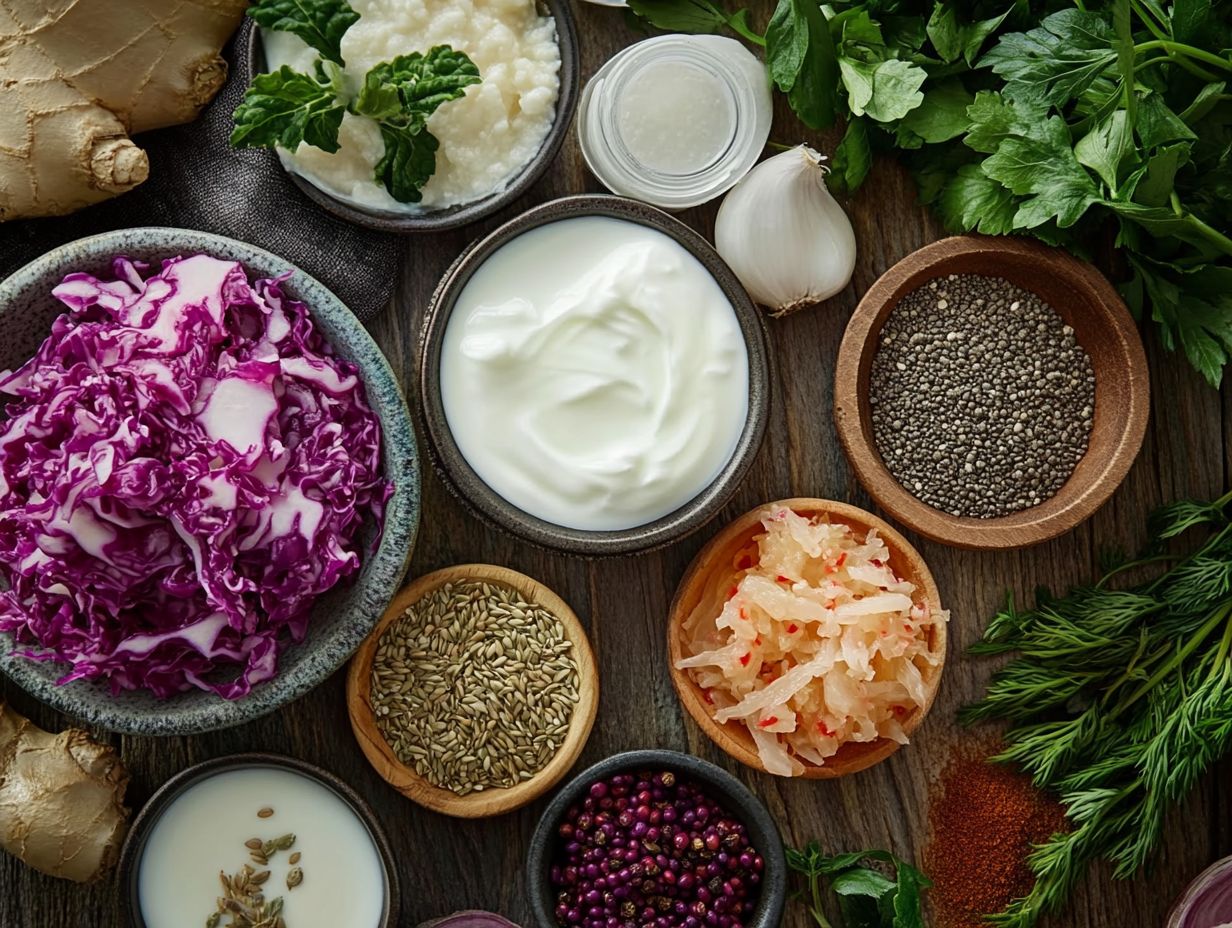The Role of Probiotics in Digestive Health
Probiotics are essential for maintaining and enhancing your digestive health, yet many individuals remain blissfully unaware of their significance. Discover the amazing benefits of probiotics.
This article delves into the various types of probiotics and highlights how they can improve the balance of your gut microbiome while alleviating digestive issues and inflammation. Explore the various sources of probiotics and get practical tips for selecting the right one tailored to your needs.
Additionally, we present effective strategies for seamlessly incorporating them into your daily diet. Get ready to discover how you can transform your gut health today!
Contents
- Key Takeaways:
- What are Probiotics?
- Benefits of Probiotics for Digestive Health
- Sources of Probiotics
- How to Choose the Right Probiotic
- Incorporating Probiotics into Your Diet
- Frequently Asked Questions
- What are probiotics and how do they relate to digestive health?
- How do probiotics help improve digestive health?
- What are some common digestive issues that probiotics can help with?
- How should probiotics be taken for optimal digestive health benefits?
- Are there any risks associated with taking probiotics for digestive health?
- Can probiotics be used as a preventative measure for digestive health?
Key Takeaways:

- Probiotics are live microorganisms that can improve digestive health by balancing the gut microbiome and reducing inflammation.
- Incorporate foods and supplements as sources of probiotics to reap their benefits.
- Consider your needs when choosing a probiotic by evaluating the type, number of live cultures, and strain specificity for optimal results.
What are Probiotics?
Probiotics are live bacteria that play a vital role in promoting your gut health and overall wellness. These beneficial microbes, often present in fermented foods and dietary supplements, have gained significant popularity for their remarkable ability to enhance the gut microbiome, support immune function, and combat harmful bacteria.
With various strains like Lactobacillus and Bifidobacterium at your disposal, these health products can provide therapeutic benefits for digestive system diseases and improve your nutrient absorption. Clinical studies show that maintaining a balanced gut microbiome can lead to enhanced health outcomes and a reduced risk of chronic illnesses.
Definition and Types of Probiotics
Probiotics are live microorganisms that can truly enhance your health when consumed in adequate amounts, primarily by positively influencing your gut microbiome.
These small yet mighty organisms come in various forms, with Lactobacillus and Bifidobacterium being among the most extensively researched. Each strain boasts unique benefits; for example, Lactobacillus assists in fermenting carbohydrates, which can improve both nutrient absorption and digestive health. Bifidobacterium, in contrast, plays a crucial role in strengthening your immune system and managing digestive disorders.
You ll find these probiotics in an array of health products, such as yogurt and supplements. They not only help maintain your digestive balance but also contribute significantly to your overall wellness by fostering a healthy gut environment.
Benefits of Probiotics for Digestive Health
Probiotics present a wealth of advantages for digestive health, enhancing the delicate balance of your gut microbiome. This balance is essential for the optimal functioning of your digestive system, ensuring it operates at its best.
Improving Gut Microbiome Balance

Probiotics play a crucial role in enhancing your gut microbiome balance by replenishing the beneficial microbes that combat dysbiosis (an imbalance of bacteria in the gut), a condition marked by an overgrowth of harmful bacteria.
These friendly microorganisms, including strains like Lactobacillus and Bifidobacterium, work together harmoniously to nurture a flourishing ecosystem within your gut. By promoting this balance, they not only support your digestion but also improve nutrient absorption and strengthen your immune system.
When your gut microbiome is diverse and healthy, its positive effects resonate throughout your entire body, influencing overall wellness, stabilizing your mood, and even impacting metabolic functions. By incorporating probiotics into your diet, you may observe improvements in digestive regularity and a reduction in gastrointestinal discomfort, underscoring the importance of optimizing gut health for your holistic well-being.
Reducing Digestive Issues and Inflammation
Probiotics can be a game-changer for tackling common digestive issues like antibiotic-associated diarrhea and constipation. They promote a healthier digestive system and help alleviate inflammation.
These beneficial bacteria restore the natural balance of your gut flora, which often gets disrupted by antibiotics or poor dietary choices. Research shows that certain strains, like Lactobacillus rhamnosus and Saccharomyces boulardii, can significantly reduce the incidence of diarrhea and speed up recovery times.
Studies show that probiotics may also ease the symptoms of irritable bowel syndrome (IBS) by minimizing abdominal pain and bloating, ultimately enhancing your digestive health. By nurturing a healthy gut environment, these microorganisms play a vital role in managing conditions such as inflammatory bowel disease (IBD), highlighting their potential as key players in your digestive health strategy.
Sources of Probiotics
You can find probiotics in a variety of sources, including:
- Delicious fermented foods like yogurt
- Kefir
- Dietary supplements in the form of oral capsules
Embracing these options supports your wellness journey effortlessly.
Foods and Supplements
Fermented foods like yogurt, sauerkraut, and kimchi are exceptional sources of probiotics, showcasing various strains such as Lactobacillus and Bifidobacterium that can elevate your gut health.
These delightful options provide a natural pathway for enhancing your digestive well-being. Take yogurt, for instance; it s not just celebrated for its creamy texture but also offers a simple way to introduce beneficial bacteria into your diet.
Sauerkraut is abundant in vitamins and fiber and bolsters gut flora while remaining low in calories. Then there s kimchi, a vibrant blend of spices and nutrients that adds an exciting kick to your meals.
While dietary sources are fantastic for probiotics, don t overlook the potential of supplements like capsules and powders, which can deliver higher concentrations. However, your body often thrives on food sources due to the additional nutrients and enzymes present, making fermented foods a wise choice for anyone passionate about gut health.
How to Choose the Right Probiotic

Selecting the ideal probiotic requires understanding several key factors, such as the specific strains, health benefits, and your unique digestive health needs.
Ensure that the probiotic supplements you choose align seamlessly with your gut health goals.
Factors to Consider
When selecting a probiotic, consider factors like:
- The specific strains
- The CFU count (colony-forming units)
- The associated health benefits
Understanding CFU counts is particularly essential as this metric reveals the number of viable bacteria in a product. While higher CFU counts often suggest greater health benefits, prioritize quality over mere quantity.
Strain diversity is also crucial; different strains can address a range of health concerns, from digestion to immune support. Clinical studies validating the safety and effectiveness of these probiotics can bolster your confidence in making informed choices, ensuring you select the best options tailored to your gut health needs.
Incorporating Probiotics into Your Diet
Incorporating probiotics into your diet is easily attainable through intentional dietary practices. By regularly enjoying fermented foods and considering probiotic supplements, you can fully harness their health-boosting benefits, particularly for your gut health.
Tips and Tricks for Optimal Results
For optimal results, ensure you maintain consistent probiotic consumption through a balanced diet that includes plenty of fermented foods and quality probiotic supplements tailored to your unique gut health needs.
Incorporating meal planning into your routine will make it easier for you to regularly include these beneficial foods. Embracing mindful eating practices can enhance your digestion and overall nutrient absorption, offering a holistic approach to gut health.
Combining probiotics with other health products, such as prebiotics (non-digestible food ingredients that promote the growth of beneficial bacteria) or dietary fibers (indigestible parts of plant foods that support digestion), can create synergistic effects that provide even greater support for your digestive system.
Keep in mind that lasting changes take time; your patience and commitment are essential for experiencing the full range of health benefits associated with a well-functioning gut.
Your journey towards improved gut health may take time, but get ready for some amazing rewards!
Frequently Asked Questions

What are probiotics and how do they relate to digestive health?
Probiotics are live microorganisms that can provide health benefits when consumed in adequate amounts. They have been linked to promoting digestive health by improving the balance of good bacteria in the gut.
How do probiotics help improve digestive health?
Probiotics help improve digestive health by maintaining a healthy balance of bacteria in the gut, supporting the immune system, and aiding in the digestion and absorption of nutrients.
What are some common digestive issues that probiotics can help with?
Probiotics have been found to be beneficial for a variety of digestive issues, such as irritable bowel syndrome, diarrhea, constipation, and inflammatory bowel disease.
How should probiotics be taken for optimal digestive health benefits?
The best way to consume probiotics is through food sources, such as yogurt, kefir, and fermented vegetables. Supplements can also be taken, but it is important to follow the recommended dosage and choose a reputable brand.
Are there any risks associated with taking probiotics for digestive health?
For most people, probiotics are safe and well-tolerated. However, those with compromised immune systems or serious underlying health conditions should consult with their doctor before taking probiotic supplements.
Can probiotics be used as a preventative measure for digestive health?
While probiotics have been shown to benefit digestive health, they should not be used as a replacement for a healthy diet and lifestyle. However, incorporating probiotic-rich foods into your diet may help prevent certain digestive issues.






